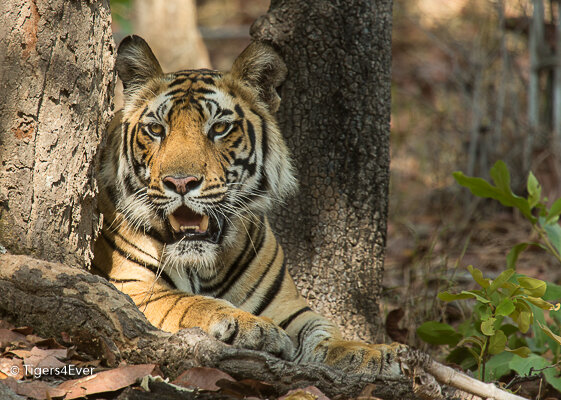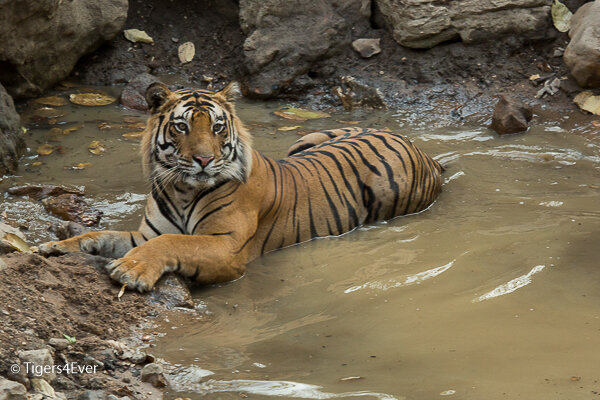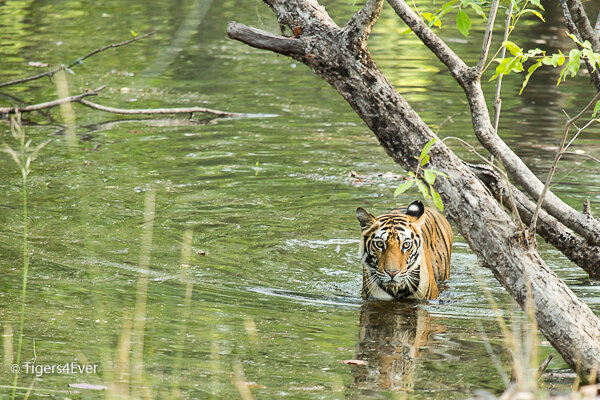By Dr. Corinne Taylor-Smith | Project Leader
Thank you for your continued amazing support for our anti-poaching patrols over the last few months, as we have faced many new challenges together. We continue to keep our anti-poaching patrols at the maximum level as both human-wildlife conflict and tiger-tiger conflict are still at 15-year highs. Without your generosity quadrupled patrols during the 2024 monsoon peak poaching season would be impossible. Tigers4Ever relies on individual donors like you to ensure that our anti-poaching patrols can safeguard wild tigers. Your donations are critical to ensuring that we provide the best possible protection for an increasing wild tiger and cub population.
Conflict is a Major Concern
Bandhavgarh’s forest habitat remains unchanged in size, yet both human and wild tiger populations are growing, placing immense pressure on the ecosystem and its inhabitants. With limited tolerance from both wild tigers and humans, conflict is inevitable. Over the past year, we have focused on several initiatives to mitigate these conflicts and address their consequences.
If you’ve been following Tigers4Ever, you know about our major project to reduce human-wildlife conflict through eco-friendly solutions like solar-powered wildlife waterholes and solar lighting at the forest’s edge, protecting high-risk villages from loss of life, livestock, and crops. Additionally, our Forest Safety Education initiative, launched last year, aims to reduce accidental encounters and attacks. We’ve also invested significantly in replacing uniforms and equipment for the brave men and women who risk their lives daily to protect wild tigers.
Our anti-poaching patrollers work tirelessly in some of the planet’s most extreme and dangerous environments, performing one of the toughest jobs in the world. India is home to three-quarters of the global wild tiger population, with 3,167 wild tigers, including 785 in Madhya Pradesh where our patrollers operate. Bandhavgarh’s wild tiger population has quadrupled from 37 in 2010 to more than 164 today, a success story made possible by your support!
However, as the wild tiger population grows, so does the risk of tiger-tiger conflict. The aggressive roars of territorial battles can echo up to 8 miles away, prompting our patrollers to approach with caution. A wounded tiger is extremely dangerous, and our patrollers must stay alert to avoid attacks on them too. They search for signs of injury and, if necessary, call for veterinary assistance. Sadly, sometimes it’s too late, and the lifeless body of a once-majestic tiger is found. Despite being a natural death, it’s heartbreaking to see such a magnificent creature lying lifeless.
As wild tiger numbers continue to rise, so do the risks of poaching, tiger-tiger conflict, and human-tiger conflict. Wild tigers need more habitat and protection. We’ve recently extended our patrolling range to include areas where sub-adult tigers from Bandhavgarh have migrated. More wild tigers mean more territorial conflicts and natural deaths, thus expanding and improving forest habitat is crucial, and we are actively working on forest rehabilitation projects as I write. We’ve assessed saplings for our tree planting initiative, and Tigers4Ever Trustees have already planted 12 saplings at Tala Camp in June 2024 as a commitment to Bandhavgarh’s future.
Every day, we confront these challenges head-on. In 2023, wild tiger deaths in India reached a 15-year high with 181 reported deaths, which was a 150% increase from 2022. The 2024 death toll has already reached 83, including 12 due to tiger-tiger conflict in Bandhavgarh. It is vital that we continue maximum patrolling during the monsoon to protect wild tigers during peak poaching season. Meanwhile, our work to enhance the existing wild tiger habitat and to reduce conflict through our wildlife waterholes project continues: https://www.globalgiving.org/projects/water-for-bandhavgarhs-tigers/.
Enhancing protection for wild tigers and their habitat ensures that more cubs survive, which in turn means that more protection is needed, and as the number of wild tigers exceeds the carrying capacity of their current habitat, further urgent action is essential. We have already reached a critical impasse in both human-wildlife and tiger-tiger conflict.
Thankfully, our patrolling helps to keep unnatural wild tiger deaths at bay in Bandhavgarh, but we cannot let down our guard as poachers are always lurking and seeking opportunities to strike. Your kind donations have ensured that we can fund increased patrolling into October 2024. We’re hoping that our supporters who can help will choose to do so, so that our anti-poaching patrols can continue to keep wild tigers safe throughout the monsoon period and beyond (https://goto.gg/28767).
Instances of human-tiger conflict at the extreme level can lead to dangerous challenging times for our anti-poaching patrollers too, as they are tiger protectors and rural communities often exact revenge on patrollers as they attempt to remove a tiger which has attacked or killed. Our patrols need to always remain vigilant, especially whilst attempting to restore calm. We continue to deliver our forest safety education training to those we encounter in the forest to try to reduce the risk of further deaths-whether those are human or tigers.
Our patrols frequently remove wires and snares set to capture wild boar and herbivores which enter the villages to raid the farmers’ crops and livestock fodder. These wires and snares are indiscriminate and have killed tigers and their cubs too. Precious tiger lives can easily be lost when they follow their prey into the villages in search of food and it is why our projects to reduce human-wildlife conflict form a vital cornerstone of our efforts to keep wild tigers safe.
We strive to keep both tigers and their prey out of the villages as it reduces the risk of retaliatory poisonings. The hot dry season has been replaced by the heavy rains and thunderstorms of the monsoon season, but this presents very challenging patrolling conditions now, so waterproof clothing, boots and powerful flashlights you’ve help us provide are crucial now: https://goto.gg/56553. Our focus will soon turn raising funds for the remaining 180 of 600 anti-poaching patrollers and chowkidars who desperately need full uniforms and boots as they have none. We recently supplied 420 of these uniforms and boots pre-monsoon thanks to your generosity and the kindness of our friends at Typical Tigers NFT, but it will take a mammoth fundraising effort to supply the remaining 180 before the end of this monsoon season (£5400/US$7020): https://goto.gg/56553.
Human Encroachment
Throughout the monsoon season, human encroachment into the forest increases as black plum, Amla and other trees bear their fruit making prized pickings for the poorest people to sell. This in turn increases the risk of human-wildlife conflict as more and more encroachers encounter wild tigers, elephants, leopards and snakes as they roam. Our safety education banners and handouts will ultimately save lives when people know what to do when they have a sudden encounter with a wild animal, but when they are ignored, there is an issue. It’s not just human lives which will be saved but those of the wild tigers too. This is because people retaliate when a tiger attacks one of their own, and such retaliation can lead to multiple deaths of both humans and tigers, so prevention is the best solution. During monsoon patrolling our brave patrollers carry laminated replicas of our safety education banners so they can show those who they encounter in the forest how to react if they meet a wild tiger, leopard, elephant or snake. The patrollers make them aware of the location of the safety information in their villages too. Raising awareness is just one vital role which our anti-poaching patrollers perform in their daily duties. (https://goto.gg/28767).
Fundraising to cover our current patrolling costs continues to challenge us so we must be cautious when extending our patrolling range. The poachers know that most of the cubs born during the pandemic are old enough to leave their mothers’ protection now and are making their own way in the world, so we are on high alert to curb this risk and have increased to quadrupled patrolling for the monsoon peak poaching season as a result. These vulnerable young tigers will face many challenges in their quest for their own territory, not least sibling rivalry and aggression from their own parents. They will also face battles with other young adult tigers seeking to establish their own territories too and other adult tigers which have already staked their claim. As young tigers migrate further afield, our brave men and women patrollers will risk their lives to keep them safe. It will be a challenge to protect them all!
We are proud of our patrollers and their amazing efforts to keep wild tigers safe. During the last 3 years their workload has increased 3-fold and our patrollers have responded with outstanding effort and hard work whilst poaching activity around India has reached a 15-year high. It is a miracle in the circumstances that we continue to keep so many wild tigers safe!
What Else are we Doing to Help
The recent increase in both human-wildlife conflict and Tiger-Tiger conflict around Bandhavgarh is a major concern, as highlighted above. As the wild tiger population continues to grow, the struggle to find sufficient territory to call home will intensify, and conflict incidents will increase in frequency, until more water and habitat can be provided to curtail it. We have spent the last six months repairing solar pumps at six of our waterhole sites and preparing to provide four more permanent wildlife waterholes in four different areas of Bandhavgarh. On completion, of these waterholes we also plan to put another solar-powered wildlife waterhole in the Kithauli core area preferably before the start of the 2024 winter season. (https://goto.gg/34315). We have also erected solar-powered street lighting in 20 areas of known human-tiger conflict in the last month as part of a pilot scheme to reduce the risk of tigers entering the villages and killing livestock and people. We are currently monitoring the results closely before rolling out the scheme in other high-risk areas.
When conflict incidents are coupled with the increased risk of poaching activities, it means that our patrollers need to always be on high alert. We must ensure that we can maintain a minimum of quadrupled patrolling in the monsoon season when we know that the poachers will be very active. https://goto.gg/28767.
Making a Difference
Your continued support means that we can cover an extra 1800 km (1135 miles) of wild tiger territory per month with our patrols tripled outside the monsoon season. During patrolling, it is essential to ensure sufficient time to search for snares; traps and signs of poisoners around forest areas where human encroachment is widespread as poachers are more active. We need to maintain our patrols around the periphery of villages where crop raiding and livestock killing is rife. Our increased patrolling helps us to curb human encroachment into wild tigers’ territories and allows us to provide safety advice for those trying to protect their crops and livestock from wandering elephants and tigers respectively.
The 60 tiger cubs born during the pandemic are now young adults, so we have many more wild tigers to keep safe, and your help is crucial. This year, we received news of 22 more precious small cubs which need our help. Your gift, however large or small can make a huge difference as to whether Bandhavgarh’s wild tigers and cubs can survive the unprecedented threats they face:
Without our help, we know that more wild tigers will die; and more humans will be mauled or killed due to encroachment or human-tiger conflict. Sadly, with every human life lost comes another threat to the wild tiger’s survival in the form of retaliation; thus, we must protect both if we are to ensure that wild tigers can have a wild future.
Please don’t hesitate if you can help, your donation can be the difference between life and death for a wild tiger, as it helps to increase our patrolling when it is most needed. Every tiger and every tiger cub counts. Thank you for making our fight against poachers, the changing climate and human-animal conflict possible. (https://goto.gg/28767).
Links:
Project reports on GlobalGiving are posted directly to globalgiving.org by Project Leaders as they are completed, generally every 3-4 months. To protect the integrity of these documents, GlobalGiving does not alter them; therefore you may find some language or formatting issues.
If you donate to this project or have donated to this project, you can receive an email when this project posts a report. You can also subscribe for reports without donating.
Support this important cause by creating a personalized fundraising page.
Start a Fundraiser

